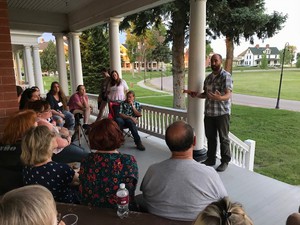Creative writing program growing

CHADRON – Growing enrollment in the recently introduced creative writing minor in the Chadron State College course catalog is a reflection of students’ interest in expressing themselves in ways that explore and give meaning to their lives, according to Markus Jones, assistant professor of English.
“There is this burst of creation that is happening with young people,” said Jones, a fiction writer who recently published his first novel, “How the Butcher Bird Finds Her Voice.” “I have been noticing for many years how students are gravitating to creative writing programs. I think it allows them to explore meaning and explore creating original content.”
Steven Coughlin, also an assistant professor of English, said that books are not in decline.
“This is actually the golden age of creative writing,” he said. “There have never been more writers finding different ways to share their work. I think we are at a point where any student can envision themselves as someone who can do this.”
Coughlin, a published poet whose second book, “Driving at Twilight,” is set for publication in December, began work to establish the creative writing program when he arrived at CSC five years ago. At the time he arrived, Coughlin said there were one or two students taking a writing minor.
“It really needed an infusion of energy,” he said.
Adding the emphasis on creative writing, which includes courses in fiction, non-fiction, poetry and a 400 level capstone class, has helped boost enrollment in the writing program to more than 20 students. Coughlin said he expects the number to hit 30 by year’s end.
“It’s really been a hotbed of action,” he said. “Now we actually have a progression through which we actively engage students.”
Instruction in creative writing isn’t about teaching creativity, which is something difficult to measure or grade, the two professors agreed.
“Creativity is something that is so subjective it becomes a problem of how to grade,” Coughlin said. “We are teachers of craft and technique.”
Just as a beginning potter starts small and gradually learns how to shape and form clay, writers have to learn basic skills, such as how to understand their audience, develop characters and create mood and atmosphere, said Jones.
“People think of creativity as only artistic, but it is really based on the fundamentals of craft,” he said. “Storytelling is storytelling. People have been doing it for thousands of years. There are some fundamentals to it that aren’t going to change.”
Those fundamentals can even be seen in the work of successful YouTube personalities, said Jones, who uses some YouTube video techniques as examples in his classes.
The addition of a class in screenwriting is being considered, Jones said, and enthusiasm is building for the idea of adding a creative writing major in the CSC English curriculum.
It’s not only English majors who are taking creative writing courses, because students learn skills valuable in other fields, said Coughlin.
“Tell me an employer who doesn’t want someone who can write well, who can think original thoughts, who can be critical in their thinking,” Coughlin said. “These are all aspects of creative writing.”
Creative writing can be challenging for students, in part because it demands more than just remembering facts that can be quickly looked up on the internet, according to Jones.
“What they can’t Google is making up a story on their own. They have to put the hard work into that themselves, and I think there is a satisfaction in that,” he said. “This minor is a reflection of where students are today and I see them really, really wanting to create original content.”
The high level of engagement the classes require is part of the reason for the creative writing program’s success, said Coughlin.
“Students get to take part in something that’s active and alive right now,” he said. “I see the creative writing program continuing to grow and flourish because it’s not about us, it’s about the students and what the students are passionate about. We are just a guide; it’s their vision.”
Category: Campus News, English

